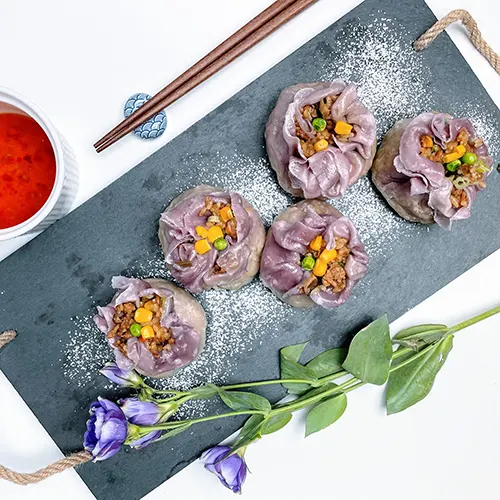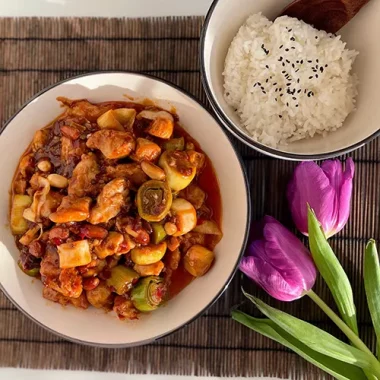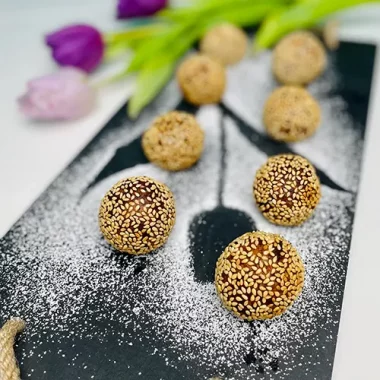Shumai is one of the most unique Chinese dumpling dishes in existence. For starters, they’re bigger than your typical pot-sticker, meaning there’s more stuffing. Furthermore, Shumai are not completely closed as the top remains slightly open to allow for some toppings. Traditionally, these topics would be orange fish roe but can be replaced with whatever tickles your fancy.
In this post, I’m going to give you what I consider to be the best Shumai recipe that can be made at home.
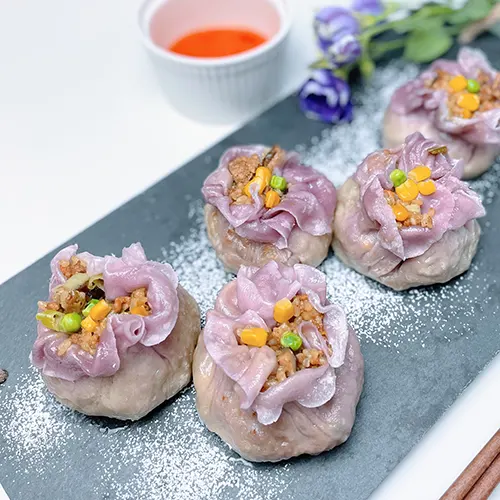
What are Shumai Dumplings?
Shumai (烧卖 shāo mài) is a type of traditional Chinese steamed dumpling commonly seen in Cantonese style restaurants. The historic record shows that a local dish of a similar description already existed in the Yuan dynasty, therefore people believe its history can be traced back at least 700 years ago.
Where Does Shumai Come From?
The story of Shumai is quite inspiring. Once upon a time, there was this restaurant. Compare to other restaurants nearby, this one was always quiet, and soon it might face being permanently shutting down. The owner of the restaurant one day looked at all the leftovers from the previous day, decided to mix the rice and meat, stuff them in a dumpling and sell them. However, because the stuffing was too much, he failed to close the dumplings as normally they would have, so instead, he just left them open and steamed them as they were. Without a name for this newly created dish, he told his staff to cook(烧) them and sell (卖) them. Unexpectedly these new dumplings sold out fast and gained a good reputation in the neighbourhood. Since then the name Shumai has been passed down through generations. There are many variations of Shumai in China, from north to south, ranging from vegetable to seafood to different kinds of meat as well as sticky rice (糯米 nuò mǐ) as stuffings.
How are Shumai Made?
In traditional Cantonese cuisine, Shumai are stuffed with either ground pork or shrimp mixed with other ingredients such as ginger, mushrooms, and spring onions. The cool thing about Shumai (and any kind of dumpling, for that matter) is that you can make it your own.
In this post, we are going to make pork, scallop and sticky rice stuffed Shumai together. It is not easy to find Chinese sticky rice (糯米 nuò mǐ) so I replace it with pudding rice, which works just fine.
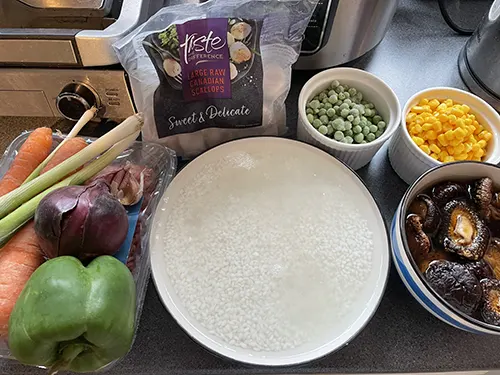
How to Steam Shumai Without a Steamer?
Let me tell you a little secret: I do not own a steamer! The horror, I know right? Well, not quite. Steamers can be somewhat overrated, especially when you have a more versatile piece of equipment like a big pot. What I do is add enough water to last a few rounds of steaming. Then I use a steaming stand and make sure that the boiling water won’t reach the Shumai. I also cut a baking sheet into squares roughly a bit larger than the bottom of my Shumai to make sure the dough doesn’t stick to the stand. After that, all you need to do is turn on the heat, place the dumplings in once you get a rolling boil, and cover the pot.
Can You Reheat Shumai?
Yes, you can reheat Shumai. I believe the best way is to just steam them using the method I described above. Alternatively, you can lightly fry them, which is a treat in itself. The added crunch gives the dumplings a whole new dimension so I recommend making extra to fry later.
Shumai
Course: Dumplings, MainCuisine: Chinese, CantoneseDifficulty: Medium4
servings10
hours50
minutesThis recipe shows you how to make authentic homemade Cantonese Shumai with a ground pork and rice stuffing.
Ingredients
Pudding rice ½ cup
Green peas ¼ cup
Sweet corn ¼ cup
10% fat minced pork 300g
10 dried Chinese shiitake mushrooms (香菇 xiāng gū)
1 purple onion
1 green bell pepper
3 spring onions
2 medium-sized carrots
5 cloves of garlic
Scallops 50g
Wangshouyi 13 spices ¼ tsp
Light soy 1 tbsp
Dark soy 1 tbsp
Oyster sauce ½ tbsp
Sugar 1 tsp
Purple cabbage leaves x 5
3 tsp white vinegar
Plain flour 240g
Corn starch 120g
Salt ¼ tsp
Directions
- Prepare the dough
- Boil 5 pieces of purple cabbage leaves in a cooking pot.
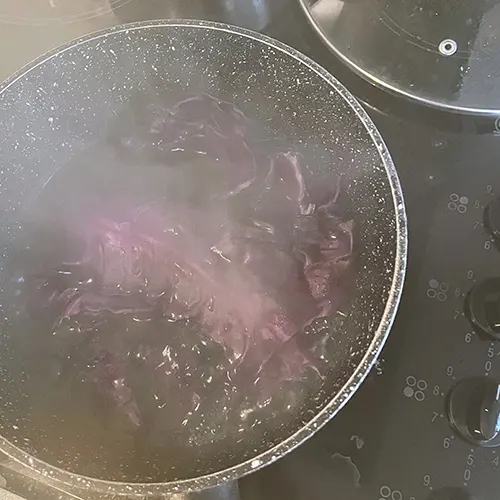
- Use a hand blender to blend and filter the juice (now it is dark purple).
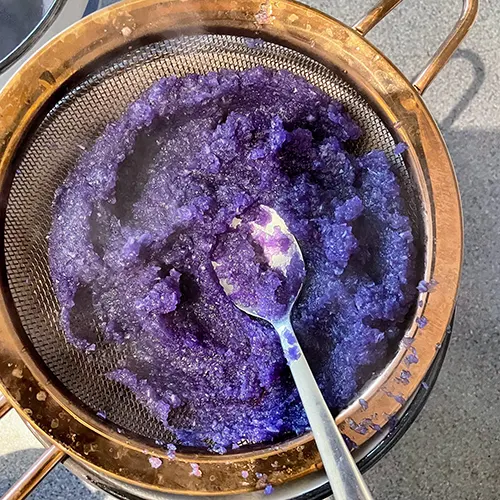
- Add 3 tsp white vinegar into the juice, stir and wait for it to turn pink. Set it aside to cool.
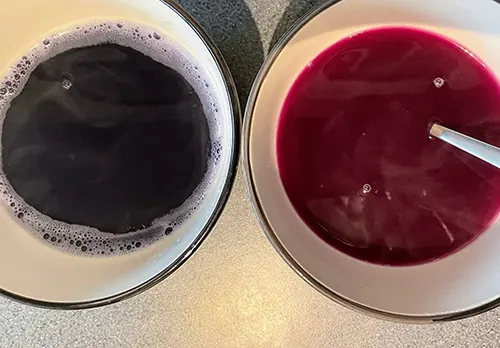
- Mix 240g plain flour, 120g corn starch, ¼ tsp salt in a container.
- Divide the flour mix into two containers, each one should be around 180g.
- Pour 80-90g water into one of the flour mix, stir and knead. Pour 80-90g cooled pink cabbage juice into the other flour mix, stir and knead.
- Cover both doughs with a film and let them rest for 30 mins.
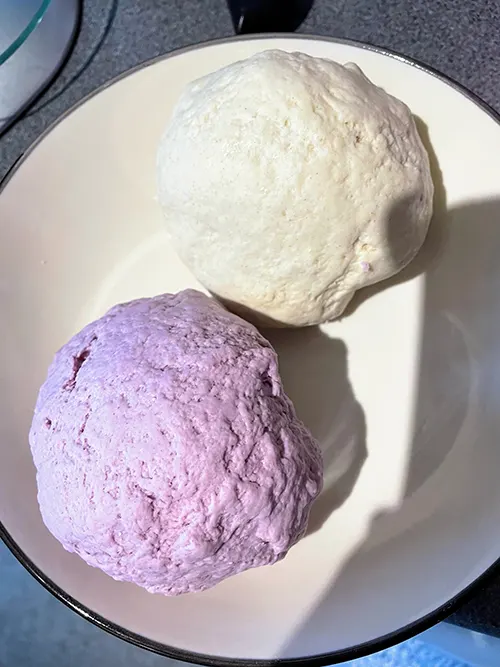
- Prepare the stuffing
- Soak 1/2 cup pudding rice in fresh water overnight.
- Soak 10 dried Chinese shiitake mushrooms in fresh water for 1 hour. Wash thoroughly before soaking.
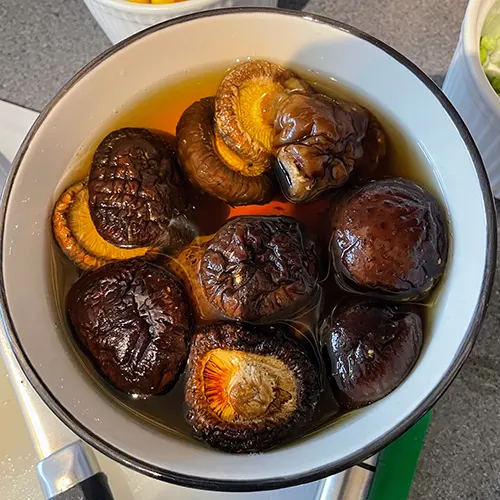
- Peel the carrots and squeeze the mushrooms dry. Cut the mushrooms, bell pepper and carrots into small cubes, then place them in a bowl with green peas and sweet corns. Save the juice from the shiitake mushrooms for later use, because we don’t want all that flavour to go to waste.
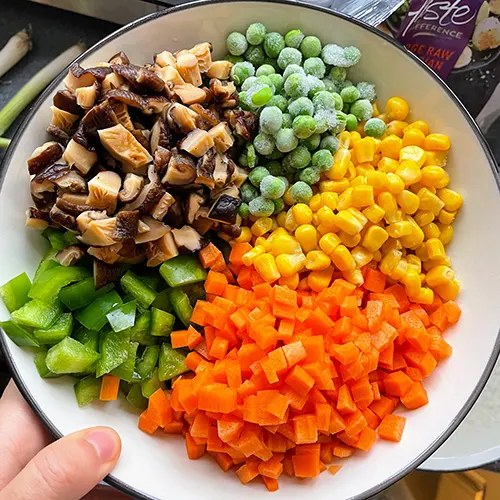
- Finely blend the purple onion and 5 cloves of garlic.
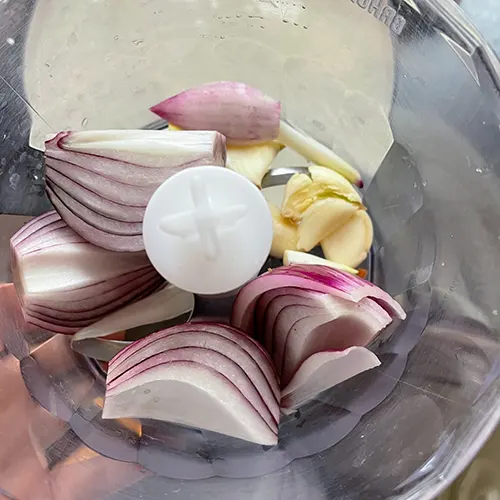
- Finely blend the scallops.
- Stir fry the finely blended onion and garlic with a tsp of vegetable oil until softened.
- Add minced pork with blended scallops.
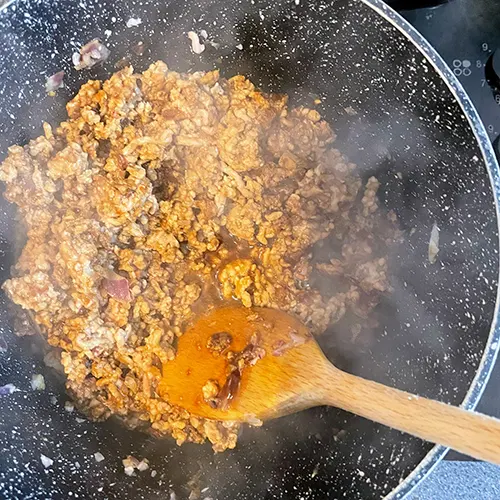
- Add 1 tbsp light soy, 1 tbsp dark soy, ½ tbsp oyster sauce, ¼ tsp Wangshouyi 13 spices and 1 tsp sugar into the mix. Stir fry well until thoroughly cooked. Turn off the stove. Add in the vegetables and mix well.
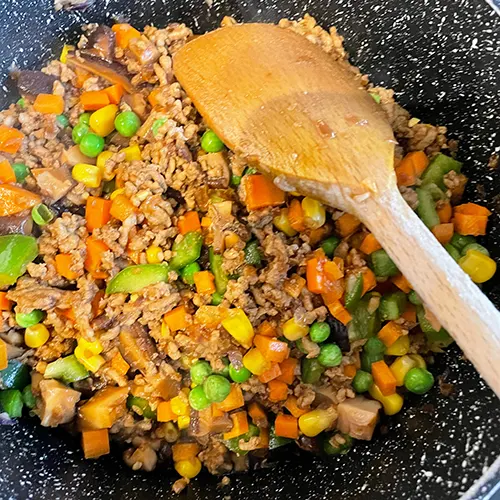
- Drained the soaked pudding rice, and put them in your slow cooker/rice cooker. Add your cooked and seasoned minced pork and vegetable mix to your rice.
- Pour the saved mushroom juice with fresh water into your slow cooker until the liquid reaches the surface of all the ingredients.
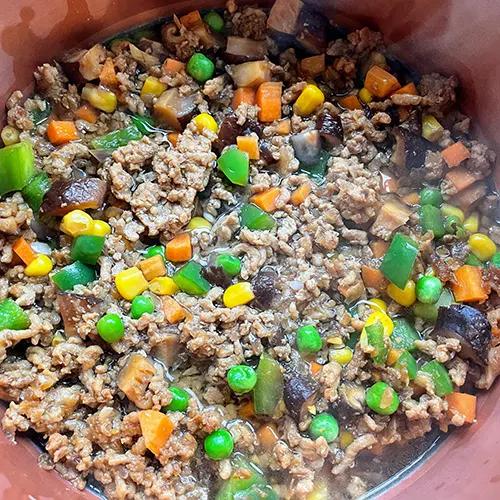
- Mix well and close the lid. Turn on the “rice” option and let it work the magic.
- After it is done. Don’t open the airway immediately to let the steam out. Instead, let it sit for another 10 mins.
- Open the lid, sprinkle some diced spring onion, mix well and let the rice stuffing cool while we prepare the Shumai skin.
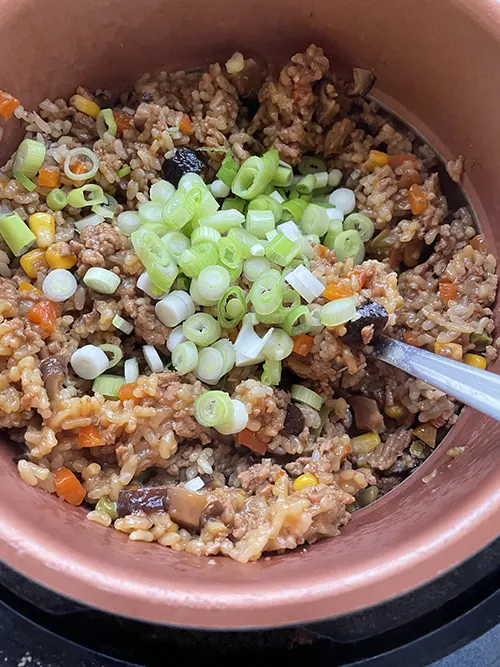
- Assemble your Shumai
- Sort the rested dough into a long roll (white) and a larger piece with the same length (pinkish purple).
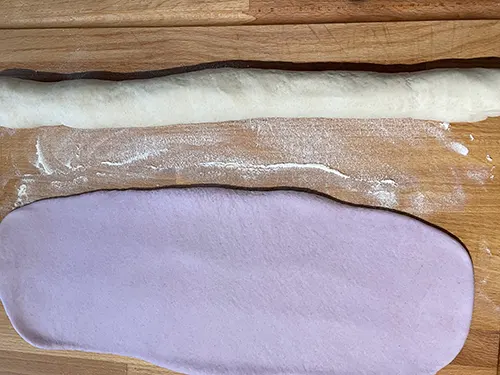
- Gently wrap the pinkish-purple skin outside the white dough. Roughly 2 cm diameter.
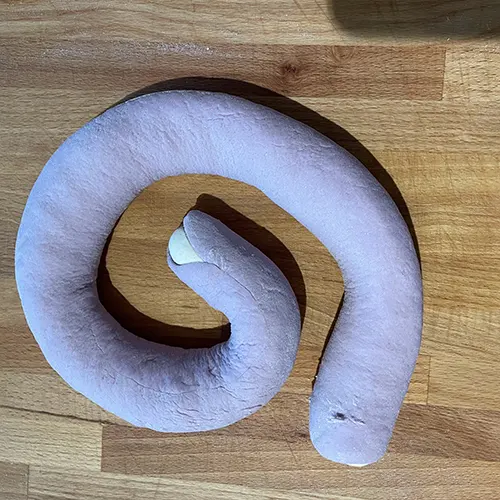
- Cut the long dough into small pieces (1 cm in length).
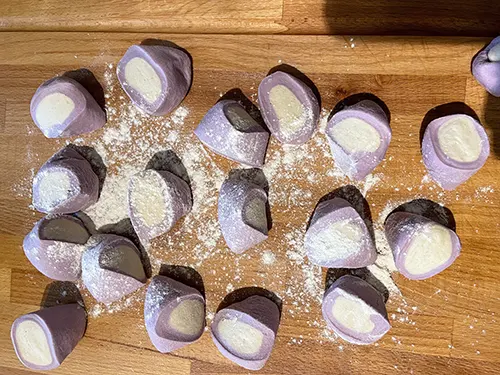
- Spread flour on top and flatten them.
- Use a rolling pin to roll the mini doughs into dumpling skins.
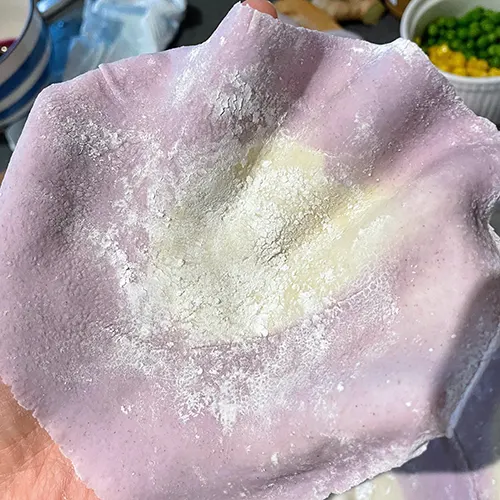
- Spread more flour between skins to prevent them from sticking to each other.
- After the rice stuffing is cool, spread the stuffing on a piece of skin. Remember to leave some space on the edge.
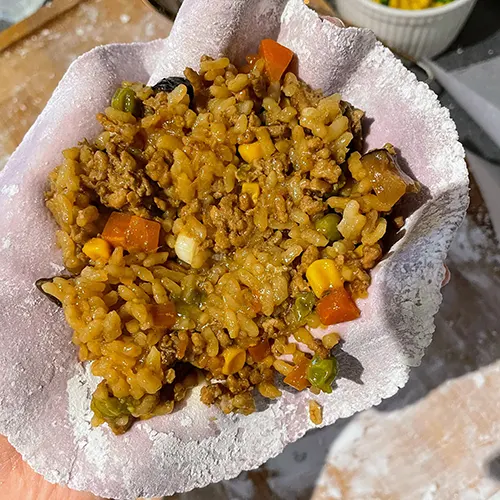
- Close your hand gently, while using the other hand to squeeze the “neck” of the Shumai. The first two may not come out the way you expected but it is ok. Keep trying and you will get the hang of it.
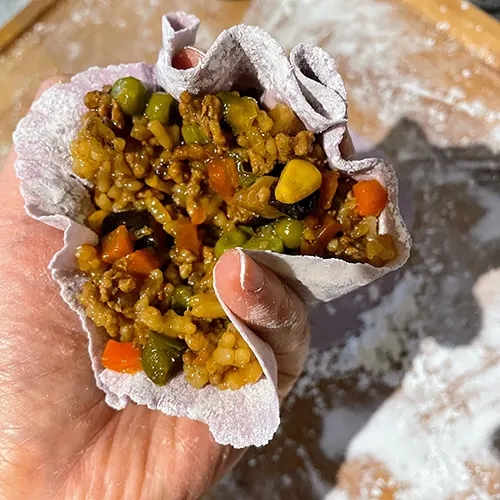
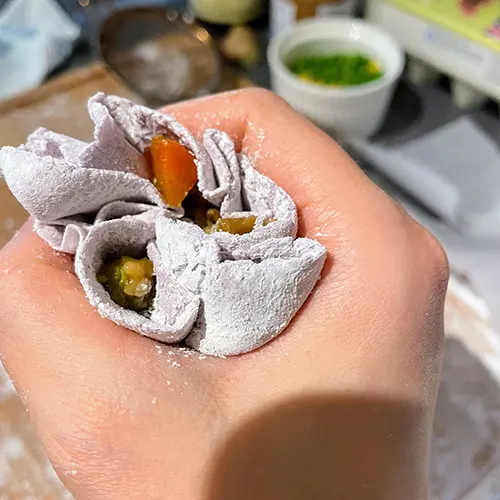
- After you are done with them, add baking sheets squares underneath each one and place them gently on your steamer or steaming stand (while the water underneath is boiling).
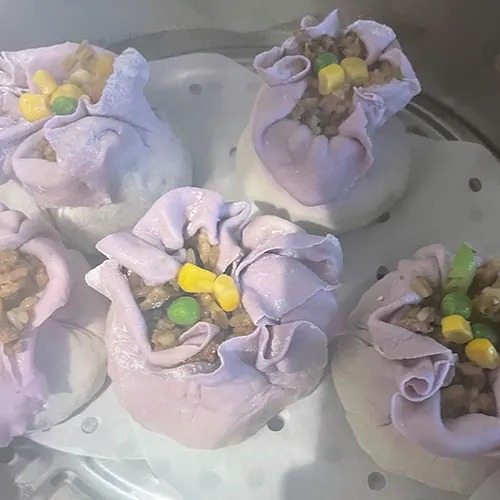
- Cover the lid and let them steam for 5 minutes. Voila!
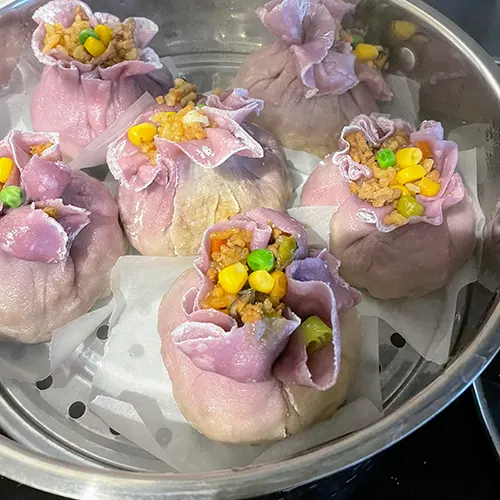
- You could serve them with Chinese dark vinegar, eat them as they are, or like Yannis, eat them with his favourite sweet chilli sauce 😉 One bite is a mouth full of flavours. 您慢用(nín màn yòng)!

Try It Yourself!
And there you have it! You now know how to make authentic Chinese Shumai with ground pork, scallops and sticky rice. Give the recipe a try and let us know how it goes in the comments! We’d love to hear from you. Also, be sure to share your creation on Instagram and tag us @linschinesekitchen.
